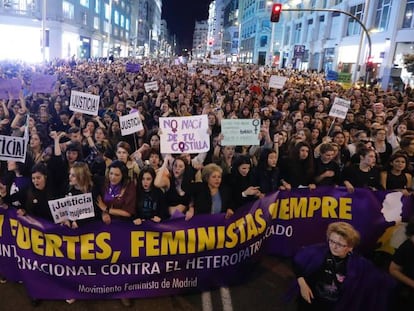Deputy PM: ¡°Surrogacy utilizes the bodies of the poorest women¡±
Carmen Calvo speaks to EL PA?S about the agenda of Spain¡¯s new ¡°feminist¡± Socialist Party government


The most powerful woman in the Spanish government still hasn¡¯t had time to make any changes to her new desk. Carmen Calvo moved on Thursday of last week to the bright and enormous room that houses the deputy prime minister¡¯s office inside La Moncloa government complex.
Calvo, who was born in the Andalusian province of C¨®rdoba in 1957, says she has barely slept a wink since she was tasked with drafting the no-confidence motion that brought down Mariano Rajoy and his Popular Party (PP) government a little over a week ago.
The right has always been very late on feminist issues
When she served as culture minister in the first administration of Socialist Prime Minister Jos¨¦ Luis Rodr¨ªguez Zapatero (2004-2009), she would walk into this room to discuss policy with Mar¨ªa Teresa Fern¨¢ndez de la Vega, the deputy PM at the time. She was also in here often in recent months, to negotiate the application of direct rule in Catalonia with the office holder until 10 days ago, Soraya S¨¢enz de Santamar¨ªa.
In her first print interview as the new deputy PM and equality minister under the Socialist government of Pedro S¨¢nchez, Calvo addressed the policies required to achieve greater gender equality in Spain, and offered opinions on controversial issues such as surrogacy. Herself a member of the Cabinet with the most female ministers in Spain¡¯s democratic history, Calvo discussed the growing place that feminism is taking in the public agenda.
Question. Why has feminism developed such force in Spain, compared to Italy, Portugal or France?
Answer. Because of 40 years¡¯ worth of work by the feminist movement and by many women in this country who have gained awareness in democracy. And now all that is erupting. Spain has a spectacular women¡¯s association movement.
Q. Is this a feminist government?
A. Absolutely. But not just because there are so many women ministers, but because of its goals. This moment had to arrive, and the approach had to be progressive, evidently. It could not come from any other place.
We are going to enjoy a feminist prime minister who is going to do a lot of good for women
Q. Is the political right not feminist?
A. The right has always been very late on feminist issues, very much forced to understand, in many cases, what the progress on civil liberties and freedoms represents. We have seen it with the rights of homosexuals, with civil marriage. The right is always lagging behind, as though forced to move forward. But it doesn¡¯t matter, as much of what feminism proposes is really about democracy.
Q. What will be the government¡¯s first measure to improve equality?
A. Two quick ones. The State Pact against Gender Violence. We are working on a bilateral work agenda with regional governments, which are where there will be important shifts in social policy. Women deserve to be safe and for crimes not to be committed against us just because we are women.
Q. And the second?
A. Work equality. We need for women to have economic independence. Dignified work, professional promotions, work compatibility for when they want to be mothers. This is the touchstone of their freedom.
Q. Fourteen years after the Law against Gender Violence, the number of women killed in Spain by a partner or ex has still not dropped below 40 a year.
A. I worry about each and every one of them. In democracy, we sometimes think, more or less with good intentions, that laws will change everything. They are essential to transform reality but we need to put in funding and work into campaigns. The former government did not invest anything in campaigns on education, responsibility and social awareness.
Rape cannot be trivialized because it destroys a woman¡¯s life
Q. On the La Manada sentence, where five men were found guilty of sexually abusing but not raping an 18-year-old, you said that ¡°justice simply has not been just.¡± Do you still believe this?
A. The interpretation of the laws was not at all sensitive to the the reality faced by women in such serious crimes as this one ¡ Especially serious crimes are being committed against women, including rape, which cannot be trivialized because it destroys a woman¡¯s life.
Q. Do you think Spain needs to regulate surrogacy?
A. Our position is clear. It is called wombs for rent and it is the latest utilization of women¡¯s bodies, another trade for sale. It is especially serious because it uses the body of the poorest women. There is no value in using euphemisms here.
Q. When will there be a female prime minister?
A. [Laughing] We are going to enjoy a feminist prime minister who is going to do a lot of good for women ... Women have been winning battle after battle, some with great difficulty. It will have to come.
English version by Susana Urra and Melissa Kitson.
Tu suscripci¨®n se est¨¢ usando en otro dispositivo
?Quieres a?adir otro usuario a tu suscripci¨®n?
Si contin¨²as leyendo en este dispositivo, no se podr¨¢ leer en el otro.
FlechaTu suscripci¨®n se est¨¢ usando en otro dispositivo y solo puedes acceder a EL PA?S desde un dispositivo a la vez.
Si quieres compartir tu cuenta, cambia tu suscripci¨®n a la modalidad Premium, as¨ª podr¨¢s a?adir otro usuario. Cada uno acceder¨¢ con su propia cuenta de email, lo que os permitir¨¢ personalizar vuestra experiencia en EL PA?S.
?Tienes una suscripci¨®n de empresa? Accede aqu¨ª para contratar m¨¢s cuentas.
En el caso de no saber qui¨¦n est¨¢ usando tu cuenta, te recomendamos cambiar tu contrase?a aqu¨ª.
Si decides continuar compartiendo tu cuenta, este mensaje se mostrar¨¢ en tu dispositivo y en el de la otra persona que est¨¢ usando tu cuenta de forma indefinida, afectando a tu experiencia de lectura. Puedes consultar aqu¨ª los t¨¦rminos y condiciones de la suscripci¨®n digital.










































